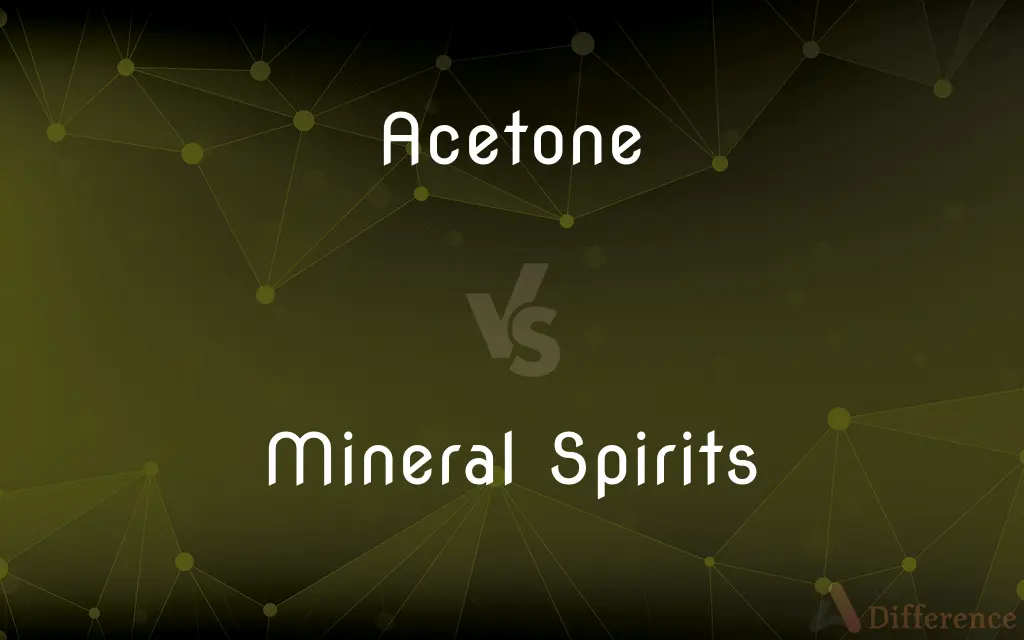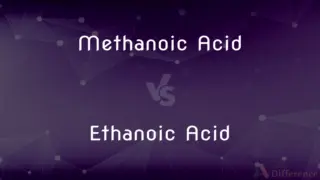Acetone vs. Mineral Spirits — What's the Difference?
By Urooj Arif & Maham Liaqat — Published on July 31, 2024
Acetone is a fast-evaporating, highly volatile solvent used for thinning and cleaning, especially in nail polish removal. Mineral spirits, less volatile, are used for thinning oil-based paints and cleaning brushes, offering a milder alternative.

Difference Between Acetone and Mineral Spirits
Table of Contents
ADVERTISEMENT
Key Differences
Acetone, a solvent found in many household and industrial products, is known for its effectiveness in breaking down and dissolving substances like nail polish, making it a popular choice in cosmetics and painting industries. Its high volatility means it evaporates quickly, leaving little residue but requiring careful handling due to its flammability and strong odor.
Mineral spirits, also known as white spirit, are derived from petroleum and have a much slower evaporation rate compared to acetone. This characteristic makes them ideal for thinning oil-based paints and varnishes, as well as for cleaning brushes and tools used in painting. Their less volatile nature results in a milder odor and reduced flammability, making them safer for prolonged use in less ventilated areas.
Acetone's quick evaporation rate is advantageous for tasks requiring rapid drying, this property also makes it more hazardous in terms of flammability and potential health effects from inhalation. Its effectiveness as a solvent for plastics and synthetic fibers, however, is unmatched by mineral spirits.
Mineral spirits, being less aggressive than acetone, are preferred for delicate cleaning tasks and for thinning paints where a slower drying time is beneficial. This solvent is less likely to damage surfaces or remove finishes, making it suitable for a wide range of materials and applications in woodworking and painting.
The choice between acetone and mineral spirits depends on the specific needs of the task at hand. Acetone is best suited for quick, aggressive cleaning and thinning tasks, while mineral spirits are better for slower, more controlled applications where surface preservation is key.
ADVERTISEMENT
Comparison Chart
Evaporation Rate
Fast
Slow
Volatility
Highly volatile
Less volatile
Common Uses
Nail polish remover, plastic solvent
Thinning oil-based paints, cleaning brushes
Odor
Strong
Milder
Flammability
High
Lower
Safety
Requires careful handling
Safer for prolonged use
Suitability
Quick drying applications
Delicate cleaning, slow drying applications
Effect on Surfaces
Can damage sensitive materials
Less likely to damage finishes
Compare with Definitions
Acetone
Acetone is used in the preparation of metal before painting.
The metal was cleaned with acetone for a smooth paint application.
Mineral Spirits
Mineral spirits have a slower evaporation rate.
The mineral spirits took longer to dry, allowing for easier cleanup.
Acetone
Acetone is a fast-evaporating solvent commonly used for removing nail polish.
She used acetone to quickly remove her nail polish.
Mineral Spirits
They are less hazardous and have a milder odor.
Mineral spirits are preferred indoors due to their milder odor.
Acetone
Acetone is highly volatile and flammable.
Acetone's high volatility requires it to be used with caution.
Mineral Spirits
They're effective in cleaning paint brushes and tools.
He cleaned his brushes with mineral spirits after painting.
Acetone
It's effective in cleaning surfaces and degreasing.
He cleaned the grease off the parts with acetone.
Mineral Spirits
Mineral spirits are used for thinning oil-based paints.
She thinned the paint with mineral spirits for a smoother application.
Acetone
It can dissolve plastics and synthetic fibers.
Acetone was used to dissolve the plastic residue.
Mineral Spirits
Mineral spirits are suitable for delicate surface cleaning.
The antique furniture was gently cleaned with mineral spirits.
Acetone
A colorless, volatile, extremely flammable liquid ketone, C3H6O, widely used as an organic solvent. It is one of the ketone bodies that accumulate in the blood and urine when fat is being metabolized.
Acetone
(organic compound) A colourless, volatile, flammable liquid ketone, (CH3)2CO, used as a solvent.
Acetone
A volatile liquid consisting of three parts of carbon, six of hydrogen, and one of oxygen; pyroacetic spirit, - obtained by the distillation of certain acetates, or by the destructive distillation of citric acid, starch, sugar, or gum, with quicklime.
Acetone
The simplest ketone; a highly inflammable liquid widely used as an organic solvent and as material for making plastics
Common Curiosities
Can I use mineral spirits on plastic?
Mineral spirits are generally safer on plastics than acetone, but testing on an inconspicuous area is recommended to avoid damage.
Can mineral spirits be used instead of acetone?
Yes, but with different outcomes due to their varying evaporation rates and solvent strengths.
Are mineral spirits safe for all paint types?
Mineral spirits are suitable for oil-based paints but not for water-based paints, as they can affect the paint's consistency and drying time.
Are acetone and mineral spirits interchangeable?
They are not directly interchangeable; each solvent serves specific purposes based on its properties.
Is acetone more effective than mineral spirits?
Acetone is more effective for certain tasks like removing nail polish or dissolving plastics, whereas mineral spirits are better for thinning paints and cleaning brushes without damaging the material.
Can mineral spirits be used on wood?
Yes, mineral spirits can be used to clean wood surfaces, remove grime, or prepare the surface for finishing.
What precautions should be taken when using acetone?
Use acetone in well-ventilated areas, wear gloves and eye protection, and keep it away from open flames.
How do I dispose of acetone or mineral spirits?
Both should be disposed of according to local hazardous waste disposal regulations to prevent environmental harm.
Is there an odorless alternative to mineral spirits?
Odorless mineral spirits are available, which are refined to remove the aromatic solvents, reducing the odor.
Can acetone remove paint?
Yes, acetone can remove certain types of paint, especially if they are fresh or not fully cured.
Share Your Discovery

Previous Comparison
Freelancing vs. Outsourcing
Next Comparison
Methanoic Acid vs. Ethanoic AcidAuthor Spotlight
Written by
Urooj ArifUrooj is a skilled content writer at Ask Difference, known for her exceptional ability to simplify complex topics into engaging and informative content. With a passion for research and a flair for clear, concise writing, she consistently delivers articles that resonate with our diverse audience.
Co-written by
Maham Liaqat












































